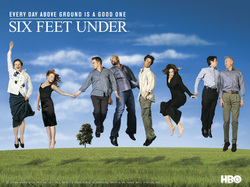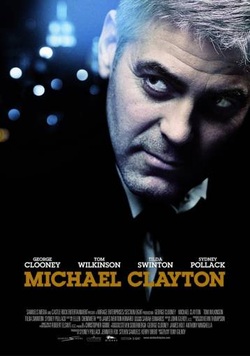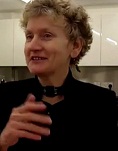
 I often get letters from writers asking me for advice about getting into the film and TV industry, sometimes also asking about how to get agents. I can’t help you with agents, I’m afraid. Getting agents is very hard and agents are not usually interested until a writer has some kind of track record. On the bright side, as many writers will tell you, it often happens in the film and TV industry that the writer is first approached by a director or producer - and only then does the agent come in, to organise the actual deal. So don't feel that you must have an agent to succeed, or that breaking in depends on having an agent. Most writers get started without an agent. Really, the first thing for any writer to do is to make themselves and their work known to their local film, TV and theatre people. Become part of the industry so that people know you and realise that you're serious about wanting to become a writer. That way, if they're looking for a writer they'll remember you. Don’t wait for people to come to you, go out and find people. Try to create your own opportunities. Many countries have schemes to help new writers and filmmakers (this includes developing countries). Offer your services and work for free at first, if necessary, or, if there is money, for a share of the profits. Show yourself to be a person who's full of energy, helpful, a good team player and determined to carve out a career for themselves in the industry. Think of people like the filmmaker Mike Leigh - who started off by making his own films with amateurs and a non-existent budget. If you have written material, create your own website or Facebook page (for free online) so that you have an international identity. Even one page is fine. Provide a brief description of your scripts (just a couple of lines) and/or the kind of work you’re interested in doing. Next, go online and join The London Screenwriters’ Festival. It’s free, and you get free writers’ tips and videos of filmmakers talking about their work. I mention the LSF because I think the site and the festival is very good, but there are lots of sites that provide scriptwriting and other technical help online. I'd suggest making some short films (even using just your mobile phone and some friends as actors ) and put them on YouTube. Get a twitter account and tweet about your work. All of these things give people a chance to notice you hence create the possibility that someone will ask you to work for or with them, or be interested in your material. Oh yes. Don't forget to try writing for radio and theatre too. It's often a bit easier to break in there. Keep writing. I hope this is useful. Good luck.
0 Comments
 I loved 'Six Feet Under'. Brilliant TV. So here's a practical plotting exercise with a TV slant that will strengthen your 'story muscle' across all forms of scriptwriting. One of the hardest skills to master as a scriptwriter is practical plotting at speed. It takes plain old practice. Keep your answers in a portfolio that you can show to a producer to illustrate how good a writer you are. Brainstorm ten ideas for interesting moral dilemmas that a doctor in a TV medical series might face (just a sentence each). Remember, give yourself permission to write down weak ideas (you will filter them later) Go for quantity not quality because this way you’ll flush out all of the clichés first. If you are thinking: ‘how cheesy is that!’, well, fair comment – in a way. Your answers could well be cheesy and clichéd – that’s what happens in bad TV writing. However, the test for you –what will show that you are a good writer – is to create brilliant, thought- provoking dilemmas out of a task that seems inherently doomed to cheesiness. The task in TV writing is usually to escape the cliches. It's hard. Push yourself.  Here's an interesting question I got a while ago about preview flashbacks in a short film. So what is preview flashback structure? Preview flashback structure is when a scene taken from the end of the film is placed at the start, after which the film then jumps back to its disturbance (how the story started) and continues uninterrupted until its end. So the opening scene acts like a teaser, or preview. The scene chosen to be seen first (the 'preview' scene) is usually the climax or second act turning point of the story (because these are so inherently dramatic they easily grab the audience), but sometimes other dramatic high points are used (you'll need to check out my book The 21st Century Screenplay for details - no room here). The movie Michael Clayton uses a preview flashback, by the way. The Question Dear Linda, I wanted to ask you a quick question about preview flashbacks. Do I need to continue the preview scene which I start the film with at the end or could I finish the story right after I connect it to what I have shown in the beginning? My answer It’s very hard to give an answer about a script that I haven’t seen and unfortunately I don’t have the time to read your script. However, there’s no reason why your short film shouldn’t end right after the return of the opening scene,. However, be careful that the ending is striking enough to end the film with impact. You may have to add an ironic twist – a ‘Rosebud’ twist, as I explained in the seminar. This is to avoid an anticlimax or ‘fizzer’ when you repeat the scene. Mostly, when the opening scene of a film is actually the climax, people do insert an ironic twist. So think carefully about whether you need an ironic twist or not. I'd add here that, obviously, the preview scene would need to be from the last part of the film for this to work. The return of the opening scene would need to provide pleasing closure. |
AuthorLinda is a screenwriter, novelist and playwright. As well as teaching and mentoring writers around the world, she regularly consults on screenplays at the highest level in the US, UK and Australia. Subscribe to Linda Aronson's Craft Skills NewsletterArchives
June 2017
Categories
All
Note: Hi everyone. For RSS feed from this blog, you'll need feedly.com or theoldreader.com. Thanks, Linda
|
 RSS Feed
RSS Feed


